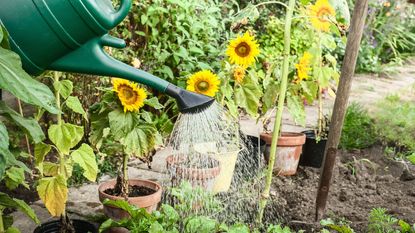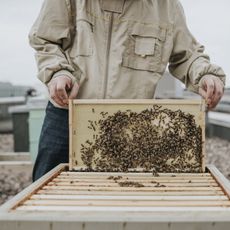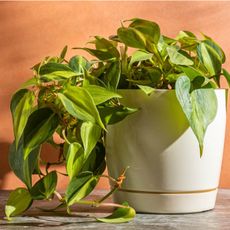Sunflower Planting Pros And Cons


Sunflowers (Helianthus annuus) are as hard to resist as puppies, with their bright petals and happy "faces" that turn toward the sun. And they can serve many useful purposes in your garden. Still, they have a few downsides that a gardener needs to take into account as he or she is making the big decision. Read on to learn the benefits of growing sunflowers as well as a couple of reasons to think twice, as issues with sunflowers sometimes happen too.
Sunflower Planting Pros
(Teo's viewpoint) There are so many reasons to grow sunflowers that it is hard to know where to begin. Sunflowers make great garden focal points with their tall, strong stems and large, cheerful blossoms. Here are my sunflower planting pros: Their impressive height has advantages. These plants can shoot up just like Jack's beanstalk to attain a full height in short order, usually rising to 5 to 12 feet (1.5 to 4 meters). This height can serve a gardener well, and not just for vertical interest. Some plants, and even veggies, prefer dappled shade. Even in a full sun garden, you can provide partial shade by planting under the sunflowers. And a tight row of sunflowers makes an attractive temporary hedge to hide the compost or liven up a bland wall. They attract helpful pollinators. Gardeners like sunflowers for their vivid colors, but we aren't alone in this admiration. Nature's top pollinators are bees, and sunflowers' showy outer petals draw many different species, including honeybees and bumble bees, to the high-quality nectar. The bees are quite likely to pollinate other plants during their stay. The pretty flowers also bring birds to your yard to eat the sunflower seeds. Not only do wild birds add song and movement to a garden, but they also polish off a few insects while they are there, insects that might otherwise hurt your crops. Sunflower seeds limit weeds. Did you know that sunflowers can also keep down weeds in the backyard? Their seeds contain a chemical that other plants don't like. The effect of this "allelopathic" chemical is believed to inhibit the growth of nearby plants, like weeds. Sunflower roots help with contaminated soil. That's not all the benefits of growing sunflowers...the roots of these amazing flowers can also help detox heavy metals from the soil, like lead, arsenic, zinc, chromium, cadmium, copper and manganese. They're beautiful and have edible seeds. Don't forget the obvious. Sunflowers in a pretty vase are the floral equivalent of sunlight in a room. With abundant sunflower plants in the garden, you can cut some stalks to grace the dining room all summer long. And you'll also have a supply of edible, nutritious sunflower seeds if you beat the birds to them first.
Cons of Planting Sunflowers
(Liz's viewpoint) Sunflowers are big, beautiful, and easy to grow. I personally have never planted one deliberately - they just appear in the garden and take off. But while there's big payoff in those giant flower heads, there are also a host of problems. You'll find a few of the negatives of growing sunflowers here. Sunflowers can kill. Of all the issues with sunflowers, perhaps the most interesting and dire is their tendency to repress the growth of other plants. This is because sunflowers are allelopathic - they exude toxins that stop nearby plants from growing. Have you ever noticed that the grass doesn't grow underneath bird feeders? That's why. It's good from the sunflower's point of view, since it leaves a wide open space every spring for new seedlings to grow. But it's bad for gardeners who want to grow lots of different plants in close quarters. Most plants are affected at least somewhat, but pole beans and potatoes are especially susceptible and should not be planted anywhere near sunflowers. Sunflowers attract squirrels. Ever notice how quickly the neighborhood squirrels can track down and obliterate a new birdfeeder? They're big fans of sunflower seeds on the plant too. And once they polish off those seeds, they'll start eyeing your vegetables. Sunflowers are also known to attract aphids and whiteflies. They can blow over. Another of the negatives of growing sunflowers is their shape. Sunflowers tend to be tall, with big leaves and flower heads, perfect for catching the wind. A big storm can take one right out, and there's a good chance it'll take out the plants around it too. They're a pain at the end of the season. One of the most exciting things about sunflowers is their sheer size - some varieties are a real sight to behold. But at the end of the season, they're still there (if they didn't blow over). Unlike some other plants that all but dissolve with the first frost, sunflowers stand where stood, tall and woody and unwieldy. And because of their allelopathic properties, they can't be left in the garden or they'll get into the soil and cause problems in the spring. They have to be torn down, chopped up, and composted - hard work for cold hands in the fall.
Are the Issues with Sunflowers Worth it?
There are several cons of planting sunflowers, there's no denying it. But they're beautiful and striking enough that most gardeners choose to plant them anyway. In the end, it's really up to you.
Gardening tips, videos, info and more delivered right to your inbox!
Sign up for the Gardening Know How newsletter today and receive a free download of our most popular eBook "How to Grow Delicious Tomatoes."

Teo Spengler has been gardening for 30 years. She is a docent at the San Francisco Botanical Garden. Her passion is trees, 250 of which she has planted on her land in France.
-
 Urban Beekeeping Guide: Top Tips For Raising Bees In The City
Urban Beekeeping Guide: Top Tips For Raising Bees In The CityUrban beekeeping can be a rewarding and appreciated pastime, but first be sure it’s legal in your city and learn the ropes of beekeeping.
By Mary Ellen Ellis
-
 2024 Plant Of The Year: Why Experts Say Philodendron Is The “It” Plant Of The Year
2024 Plant Of The Year: Why Experts Say Philodendron Is The “It” Plant Of The YearWe aren’t surprised that philodendron was designated the plant of the year. Versatile, easy-care and lovely, it’s the houseplant of the year 2024!
By Bonnie L. Grant